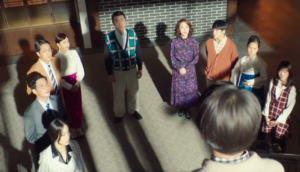
In many ways, the Korean business model of the chaebol is symbolic of the country’s unique traits. These huge conglomerates are modern powerhouses of business, stretched across wildly varying industries and fields. But they are also family-run businesses. They are powerful, ambitious and always striving forward, but they also work within the traditional notions of family and hierarchy. Think the Lannisters running Amazon, or the Disney family running car and electronics companies alongside the entertainment brand.
K-dramas are no stranger to the huge potential that this set-up brings, particularly in regard to shady deals and the struggle for power. JTBC’s new drama Reborn Rich continues this look into the world of superrich families, with the added twist of reincarnation. Delving into the history and machinations of the fictionalised Soonyang group—most likely a mix of Samsung, Hyundai and Lotte brands—the drama tells a tale of revenge through a dedicated employee, Hyeon-woo (played by Vincenzo star Song Joong-ki). Murdered by an unknown higher-up for his part in the discovery of illegal activities at the company, he is reincarnated as the family’s youngest son, retaining his own memories but growing up amongst the family that eventually killed him.
As you may have guessed, this is at its core a tale of revenge, with our central character working his way up in the world of high stakes business to find out the exact situation that got him killed. The drama does not shy away from the intricacies of chaebol deals and acquisitions, and becomes a kind of map of modern Korean history in the process. However, this does not always pay off as entertainment, and the reincarnation plot device remains oddly underexplored, whilst being key to the story.

As a primer for how chaebols function, and how they have impacted Korean society, economics and culture, Reborn Rich is at its strongest. The plot, from the outset, does not shy away from the complexities and intricacy of this world, opening with the preparations for the unveiling of a bust of the company’s founder, amid accusations of embezzlement and misconduct. This event draws in the key players of the family, and their high stakes, immediately, and doesn’t let up from there. Not an episode goes by without complex acquisitions, negotiations and double-crossings over company sales and investments.
The skill in laying out these complex processes is that it allows the drama to give a really rich and insightful look into some of the major events that made South Korea. We see the process behind the election of the first democratic president, the financial crisis of 1997, and the development of key industrial and commercial centres. The history is deftly woven into the story: for example, when the 1997 crisis hits, we see the women of the family donating their (ample) stocks of gold to help the country, as many Koreans did at the time.
However, this same intricacy of plotting and use of historical moments does also have the unfortunate side effect of overcomplicating things. Whilst it is admirable that Reborn is as confident in itself and its audience as it is in telling such a complex story, it does often lapse into confusion. Perhaps it is a fault of my own, with my, let’s say, extremely limited financial comprehension, but eventually the various character deals, while relatively well-paced and explained, start to seem very similar. When the lives of the superrich centre around continuous bargaining and machinations, it is difficult to separate them out into distinct and compelling story beats.
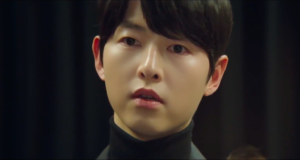
One way that the drama does, rather heavy-handedly, attempt to achieve this, is through the use of music. Whilst it may not always be clear exactly how a specific company has been bought, and how that came about, the soundtrack always makes it distinctly clear about the impact of this.
As characters discover what they have gained or lost, heavy electric guitars pound seriously and dramatically. Whilst this helps to signpost the importance of certain events (ah, I see, this is bad news for the chairman, because here is a shot of him looking angry with the guitars playing), it isn’t subtle at all, and could have easily been dialled down.
Luckily, the performances in the drama largely steer away from this clumsiness, and thus are often the highlight. Song Joong-ki plays the character of the diligent employee at the opening of Reborn effectively, but really comes into his own as the reincarnated grandson (who yes, he also plays) who is playing a long and patient game of revenge. He is always understated and difficult to read, concealing his true aims brilliantly.
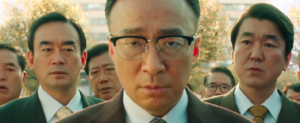
Lee Sung-min is also a great mix of calculating, charming and despicable as the founder of Soonyang group, Jin Yang-chul. Among his four children, Young-ki (Yoon Je-moon) and Dong-ki (Jo Han-chul) are not entirely distinct, though that is the point, as these two sons—eldest and second eldest—are in many ways interchangeable.
Special mention deserves to go to the one performance in this drama that is delightfully lacking in subtlety: Kim Shin-rok as the family’s only daughter, Jin Hwa-young. Snapping, shouting, whining, and completely belittling her grovelling prosecutor husband Choi Chang-je (Kim Do-hyun), Kim chomps on the scenery every time she appears. An overtop villainess, she is relentlessly fun, a spark of personality among otherwise fairly muted characterisations.
It is also worth giving a special mention to her costuming, and that of the other rich women in and around the Jin family. Whilst it doesn’t necessarily contribute anything to the drama besides a nice splash of creativity, and the fairly obvious overt outfits as a signifier for the rich being out of touch symbolism, they are very well done. Kim gets most of the fun, from wonderfully ruffled blouses to voluminous green satin and white turquoise trouser suits. But Jung Hye-young as reincarnated Hyeon-woo’s mother Hae-in, and Park Ji-hyun as the main daughter-in-law both get some standout outfits as well.
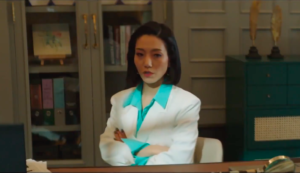
As Reborn Rich continues, there remains one question central to the entire drama that remains unanswered: how exactly does the reincarnation work? Considering that it is the entire premise behind how main character Hyeon-woo gains access to the Jin family, it is bizarrely underexplained by the halfway point.
Its main utilisation as a plot device ties in to the historical elements of the drama. When Hyeon-woo becomes reincarnated as the Jin family’s youngest grandson (Do-jun), he is sent back to 1987, when Do-jun was 14 years old. Given that he retains the personality of his murdered self from 2022, he effectively knows the entire future in great detail up to that point: for him, it is his past. Luckily, Hyeon-woo was also obsessively studious about both the entire Soonyang group, and all of the industries that they were concerned with. This means that he is able to make amazing guesses on investments due to, well, literally knowing exactly what will happen. It is this skill that propels him in the world of Soonyang, and the main sense in which the reincarnation is important.
However, aside from this handy plot point, the reincarnation is yet to be explained. This is especially bizarre given the secondary storyline of Hyeon-woo/Do-jun following his original, poor family, as they live through the same time period. This storyline indirectly indicates to us that the original Hyeon-woo is living out his first life, meaning that there are two Hyeon-woo figures co-existing at different points along the same timeline. This is used to create poignancy for our main protagonist, but begs a host of questions as to how this is possible, and what the consequences might be. Is this science fiction? Is this just a device? It is, as yet, unclear.
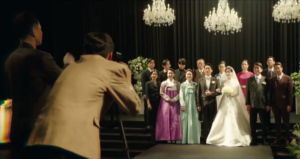
So far, Reborn Rich offers complexity that sometimes veers into murkiness, and well performed, engaging characters. As the storyline moves ever closer to catching up with its starting point, the need to answer the technical questions underpinning the plot will get greater. It will be intriguing to see just how this drama, which seems to have, thus far, retained a more clinically historical approach, will handle this. If it can maintain its tone, develop its characters and stay away from overcomplication, it has the potential to reach an exciting climax as a Chaebol revenge mystery.
(Forbes. Images via JTBC.)


